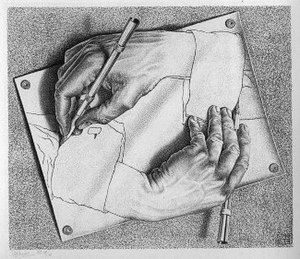Drawing - Unit 2
For the next few weeks we'll be focusing on drawing. You will need a pencil and an eraser every day. If you have access to 2B, 4B and 8B pencils (all found in a standard set of drawing pencils), bring them along - they'll certainly help you achieve value and different lines.
 Left and Right Brain Theory
Left and Right Brain Theory - In general, the left hemisphere is dominant in language: processing what you hear and handling most of the duties of speaking. It's also in charge of carrying out logic and exact mathematical computations. When you need to retrieve a fact, your left brain pulls it from your memory.
The right hemisphere is mainly in charge of spatial abilities, face recognition and processing music. It performs some math, but only rough estimations and comparisons. The brain's right side also helps us to comprehend visual imagery and make sense of what we see. It plays a role in language, particularly in interpreting context and a person's tone.
 Contour Drawing
Contour Drawing - A
Contour Drawing is an illustration without value wherein the lines follow the surface changes in the object. *Note that the definition does not speak only to the edges of objects.
Blind Contour Drawing - A
Blind Contour Drawing is done without looking at your page. A
Continuous line contour drawing is done without lifting your drawing instrument from the page
Exercise #1: Blind Contour Drawing - Draw your teacher!
Exercise #2: Continuous Blind Contour drawing - Draw your neighbour
Exercise #3: Continuous Contour - Draw your hand
Exercise #4: Draw your shoe
This week we'll start looking at typography - different styles and types of fonts. We will recreate existing fonts with precise and deliberate lines as well as inventing our own typeface graphic.
Exercise #1: Typeface practice
Exercise #2: What type are you quiz. Take the
Online Quiz
Exercise #3:
Definitions - Complete the definitions and submit a Shared Google Doc
Erercise#4:
Visual Text Project








